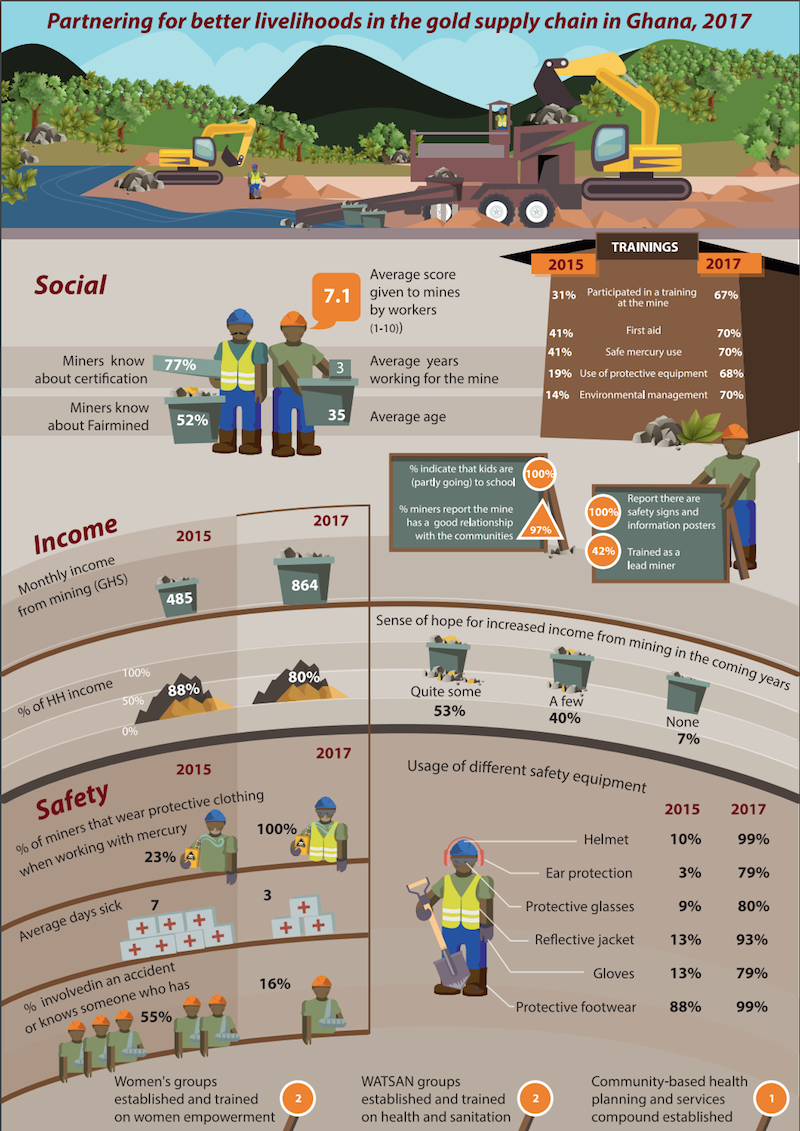Improvements in Peru
In Peru, the programme aimed to test a model for cooperation between a professional mid-scale mining company, Minera Yanaquihua, and informal artisanal and small-scale miners working on the concessions that would result in better livelihoods and better business. Solidaridad supported the company and these miners with the formalization process in particular, and with safety and environment trainings and knowledge.
The Yanaquihua mine became officially certified in 2014 according to the Responsible Jewellery Council (RJC) Code of Practices. This mine employs 145 direct workers and 674 subcontracted workers that benefit from the better practices the certification requires. An additional 594 independent small-scale miners on the mine’s concession has received training in formalization and conduct of safer, healthier practices. As a result, at least 427 small scale miners miners from the three associations have become officially registered as legal workers since the start of the programme.
The 137 women collecting low-grade ore, referred to as the pallaqueras, recently received support to become legally registered. Additionally, they’ve received personal protective equipment and training to continue their work. In general, less mercury gets used at the mine, which now processes gold in a safer and more responsible manner.
Improvements in Ghana
In Ghana, the goal was to build the capacity of the ASM miners to improve their working conditions and support two mines to become certified and attain a mid-scale status. In two mining communities, the programme aimed to improve access to healthcare and the status of women. Solidaridad supported three small-scale mines and their 117 workers, using the FairMined Standard as a tool. The mines could not apply for certification due to a mining ban put in place by the state in the final year of the programme.
In the surrounding mining communities, Solidaridad has supported 2 women’s groups to set up saving groups and alternative businesses. As a result, one of the groups created a successful soap business. The support has so far included the creation of two community-based Water and Sanitation Committees. The information session led by Solidaridad led to increased awareness on health issues such as malaria, cholera, HIV/AIDS and other sexually transmited diseases in both communities.

Reduction of Occupational Hazards
In particular, the use of protective equipment by workers increased as a result of the programme. Both in Ghana as well as in Peru, mines pay more attention to safety at the mining sites due to the training and technical assistance offered. This has contributed to a reduction in occupational hazards (knowledge of an accident at the mine went from 55% to 16% in Ghana) as well as a reduction in the number of sick days (from 7 to 3 days in Ghana and 5 to 4 days in Peru) for the great majority of miners.
Eliseo Huamani, former miner/general manager in Peru had the following to say about the developments: “Now we have a security department that protects workers. We used to improvise and, back then, many accidents could have happened. Now accidents are prevented. All the work inside the mine is being done in a responsible way. This means that miners can work in a safe and protected environment.”
The Key to Responsible Mining
The role of Solidaridad was particularly important in providing guidance and a set of practical solutions. The guidance is to be used by mines and is meant to provide the means for implementing the practical solutions.
While external factors have played a role, the programme has been key in facilitating the transition to responsible mining. Read the final report of the programme for a fuller understanding of the results. By providing practical solutions to challenges in ASM mining, the programme improved health and safety of miners and community members, contributed to better relations between ASM mines and surrounding communities and the economic opportunities of women miners.
Read the final report of the programme for a fuller understanding of the results here.
Videos
In the videos below, we show how we’ve supported the artisanal miners of Key Empire and Gold Bank in Ghana and the miners of Minera Yanaquiha in Peru to produce responsible gold.
Learn more about Solidaridad's gold projects here.

